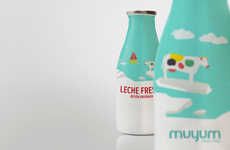
One Science Teacher Adds Ingredient Labels to Fruits and Veggies
Angela Rajic — January 25, 2014 — Lifestyle
References: jameskennedymonash.wordpress & geekologie
Australian chemistry teacher James Kennedy came up with these unique ingredient labels for all-natural foods. Kennedy lists all of the chemical components of a banana, an egg, blueberries and other fruits, vegetables and other farm fresh products we don’t usually associate with food labels.
Kennedy’s goal is to assuage people’s fear of chemicals by demonstrating that even all-natural foods have many, many chemicals in them. Increasingly, people have become concerned about all of the chemicals that potentially go in and on our food, from pesticides to the unpronounceable ingredients on the labels of the packaged food we it. Kennedy’s ingredient labels show consumers that they don’t need to fear every chemical that may or may not be in our food, and that some are necessary for our health.
Kennedy’s goal is to assuage people’s fear of chemicals by demonstrating that even all-natural foods have many, many chemicals in them. Increasingly, people have become concerned about all of the chemicals that potentially go in and on our food, from pesticides to the unpronounceable ingredients on the labels of the packaged food we it. Kennedy’s ingredient labels show consumers that they don’t need to fear every chemical that may or may not be in our food, and that some are necessary for our health.
Trend Themes
1. Chemistry-inspired Food Labels - Opportunity for food companies to adopt chemistry-inspired ingredient labels to educate consumers about the natural chemicals in their products.
2. Consumer Concern About Chemicals in Food - Opportunity for the health and wellness industry to address consumer fears by providing transparent information about the chemicals present in natural and processed foods.
3. Education on Food Chemistry - Opportunity for educators and scientists to develop programs and resources that teach consumers about the science of food and the role of chemicals in nutrition.
Industry Implications
1. Food and Beverage - Opportunity for food and beverage companies to differentiate their products by providing comprehensive information on chemical ingredients.
2. Health and Wellness - Opportunity for health and wellness companies to build trust and consumer loyalty by promoting transparency and offering education on food chemistry.
3. Education - Opportunity for educational institutions to incorporate food chemistry and labeling into science curriculum to increase understanding of the role of chemicals in food.
2.9
Score
Popularity
Activity
Freshness























